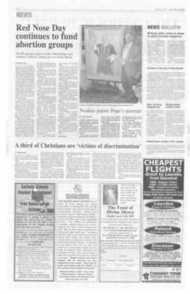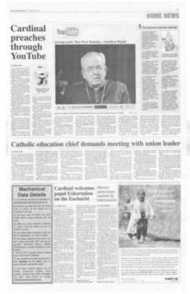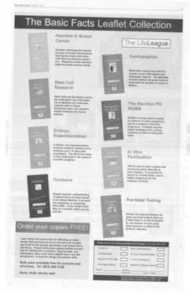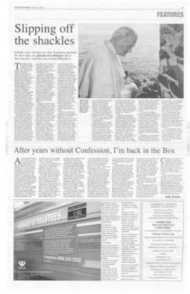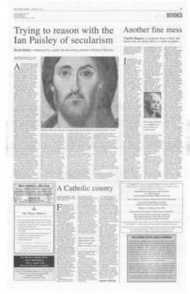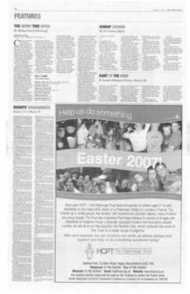Page 4, 23rd March 2007
Page 4

Report an error
Noticed an error on this page?If you've noticed an error in this article please click here to report it.
Tags
Share
Related articles
German Theologians Appeal For Cdf Reform
Miracle Puts Newman A Step Nearer To Beatification
Pope’s Us Pupil Attacks ‘hardliner’ Label As Nonsense
Romero Cause On Hold As Officials Study Whether He Died...
Exit The Enforcer, Enter The Pope
The Pope disciplines his first theologian
BY ANABEL INGE
POPE BENEDICT XVI has disciplined his first theologian since his election nearly two years ago.
But he has surprised his critics by stopping short of imposing any penalties or sanctions against Fr Jon Sobrino, one of the world's most respected proponents of liberation theology.
The notification has been directed at some of Fr Sobrino's works, which have been found to include "erroneous or dangerous propositions". In particular, Fr Sobrino places insufficient emphasis on the divinity of Christ, according to a statement prepared by the Congregation for the Doctrine of the Faith (CDF) and signed by the Pope.
Mother complaint is that his methodology makes the "Church of the poor • rather than the apostolic tradition of the Church, the ecclesial foundation of Christology.
In addition, because of the way in which the divine and human natures of Christ are dealt with in the writings, "the unity of the person of Jesus is not clear. the notification said.
The result of this, according to the notification, was to downplay the awareness Jesus had of his own divinity as well as his role in the divine plan of salvation.
A note accompanying the notification added that the CDF's issue was not with Fr Sobrino's concern for the poor but with his Christological conclusions. "Fr Sobrino manifests a preoccupation for the poor and the oppressed, particularly in Latin America," said the note. "This preoccupation certainly is shared by the whole Church."
However, in spite of expectations that Pope Benedict would silence Fr Sobrino, a Jesuit who was born in Bilbao, Spain, no disciplinary action was taken against him Instead, the notification simply warned the Church that some of Fr Sobrino's claims "could cause harm to the faithful-. This, however, leaves the way clear for diocesan bishops to ban Fr Sobrino from lecturing on Church premises, for instance, or to stop the sales of his books in Catholic bookshops.
Cardinal Levada, prefect of the CDF, said in a note to all the world's bishops that they would be responsible for adopting the "measures necessary" to implement the notification.
The notification is the culmination of a six-year investigation that focuses on two books by the liberation theologian. Jesus the Liberator: A HistoricalTheological View (1991) and Christ the Liberator:. A View from the Victims (1999).
This investigation was initiated by the then Cardinal Joseph Ratzinger, the prefect of the CDF who went on to become Pope Benedict in April 2005.1t is understood that the decision to publish the notification came after Fr Sobrino rejected invitations by the CDF to sufficiently correct the errors.
But in a letter last December to Fr Peter Hans Kolvenbach, Father General of the Jesuits, Fr Sobrino argued that the CDF's conclusions about his theology formed part of a 30-year campaign against liberation theology, which, he said, "is of little help to the poor of Jesus and to the Church of the poor".
He claimed his views had been misrepresented and that both books had been subjected to extensive reviews by fellow theologians before being submitted for publication. The Portuguese translation of Jesus the Liberator, for example, carried the imprimatur of Cardinal Paulo Evaristo Ams of Sao Paulo.
Fr Sobrino also listed a number of theologians whom he claimed had assented to the doctrinal truths expressed in his writings, and reasoned that for him to accept the Vatican's criticisms would be to cast doubt on the judgments of these figures.
The reaction of his local ordinary. Archbishop Fernando Saenz Lacalle of San Salvador, was to say that the theologian would be banned from teaching unless he adjusted his positions in accordance with the Vatican's critique.
Meanwhile Archbishop Patrick Kelly of Liverpool, the head of the doctrinal commission of the Bishops' Conference of England and Wales, said: "If there is a problem then we should take the means necessary, but on this particular issue I don't see a problem. People in England have not been complaining or are puzzled [by Jon Sobrino's writing].
"For the ordinary Catholic in the pew, this is rather obscure but nevertheless extremely important. These are technical matters but Christ's divinity is essential to our faith."
He added: "People would be wise to ponder on these matters in the days leading to Easter."
blog comments powered by Disqus



